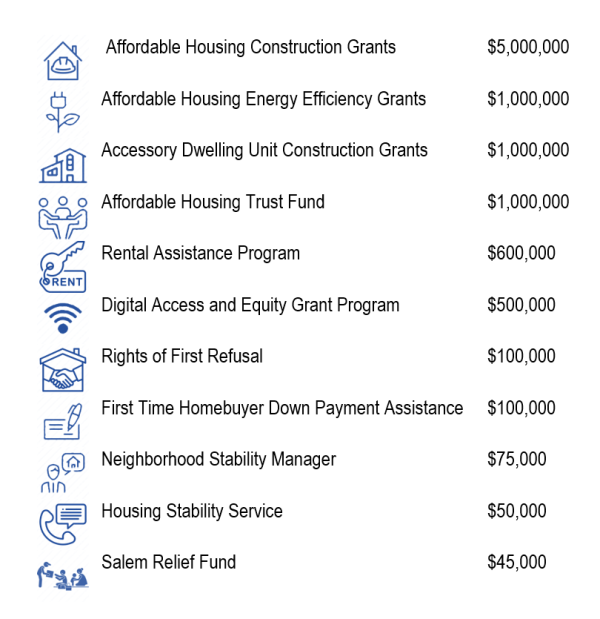City of Salem Directs Over $9 Million in ARPA Funds to Affordable Housing

Mayor Kim Driscoll today announced that as part of its first round of American Rescue Plan Act funding allocations, several City housing initiatives will receive a total of $9,470,000 in funds to help address housing affordability and availability in the community.
“For many Salem residents, the last few years of this pandemic have resulted in greater levels of housing insecurity,” said Mayor Kim Driscoll. “This, combined with the rapid increase in home values and rents, has only exacerbated the need for real action on housing and affordability. I am proud of the work that we have undertaken over the past years to address these issues here in Salem, and the availability of these federal resources now enables us to go even further to invest in solutions to our housing challenges. While these are major investments in our housing efforts, they only represent the first phase of these measures. Our ARPA plan is guided by public input gathered from the stakeholder advisory group, public forums, and resident survey. We’re also committed to being responsive to the efficacy of programs and will consistently evaluate and measure how these initiatives work so that, in future phases of Salem’s ARPA allocations, we can respond accordingly based on results and on the changing context of our local housing needs. I’m grateful to the members of Salem’s ARPA stakeholder group, our community partners, the City staff who have all helped advance this important work, and to our federal delegation – Senator Elizabeth Warren, Senator Ed Markey, and Congressman Seth Moulton - who helped make this critical funding possible.”

Affordable Housing Construction Grants: $5,000,000
This new competitive grant program will provide awards of up to $2,000,000 per project for the physical construction of affordable rental housing units that are a net addition to the City’s available affordable housing inventory. Eligible applicants include nonprofit organizations and agencies. Grant awards are capped at $100,000 per unit for construction costs and applications will be evaluated based on project viability and the level affordability of the project. Recipients will be required to submit regular post-construction reports to the City to verify affordability based on AMI. Application details will be announced shortly.
“This new construction grant program is a significant investment of local resources that will protect the availability of affordable, secure, and stable homes,” said Amanda Chiancola, deputy director of the City’s Department of Planning and Community Development. “Through the housing roadmap process, community members in Salem affirmed that they see housing as a human right and the construction grant program is one more step towards our community meeting that vision.”
Accessory Dwelling Unit (ADU) Grants: $1,000,000
The City has launched a grant program to help homeowners interested in creating an ADU at their property. Grants of up to $47,500 are available to homeowners to assist with the design and construction of permitted ADUs on the condition that the new unit is rented at 50% of fair market rent. This level of affordability is steeper than the affordability already required under the City’s existing ADU law. The grant program is intended to help homeowners invest in the creation of deeply affordable ADU rental units by covering a portion of the costs associated with the unit’s creation. This allows homeowners to capture the benefits of the ADU – additional income from rent – and keep the rent substantially affordable at the same time. To review program guidelines and requirements and to apply, visit www.salemma.gov/adu.
“ADUs are an essential part of our age-friendly efforts,” said Dominick Pangallo, co-chair of Salem for All Ages and Chief of Staff with the City of Salem. “Accessory units provide older homeowners with a greater ability to age in place in the community where they live and to generate additional income, which can be especially helpful if they’re living on a fixed income. Because of this, ADUs can help maintain neighborhood stability, ensuring older residents can continue to be part of the city where they’ve lived and raised their families. As an added benefit, by requiring low rents for grant-funded ADUs, we will create even more deeply affordable rental units for everyone – old or young, working or not working.”
Affordable Housing Energy Efficiency Enhancement Grants: $1,000,000
This new grant program will provide capital funding for energy efficiency projects at eligible affordable housing properties in the City. Eligible properties must provide subsidized housing to income-eligible residents or have rents that do not exceed 70% of fair market rent in the City. Projects must demonstrate an increase in energy efficiency for the property or a reduction in the property’s climate impact. Application details will be announced shortly.
“Salem’s Sustainability, Energy, and Resiliency Committee (SERC) wishes to offer its enthusiastic support for the new City grant program to support energy efficiency at affordable housing properties throughout the community,” said John Hayes, chair of SERC. “The climate crisis requires us to dramatically improve the energy efficiency of existing buildings and to require it for new buildings, as well as to transition away from fossil fuels in the building sector. As the City strives to accomplish these transitions from fossil fuels to renewable energy sources and to increase energy efficiency in the building sector SERC is proud that the City wants this energy transition to be fair, just, and equitable.”
Affordable Housing Trust Fund: $1,000,000
Salem’s Affordable Housing Trust Fund has helped advance policies and plans shaping the City’s ongoing work to preserve and expand affordable housing in the community. This appropriation will help support that work over the coming years and will also enable the Trust to engage more directly in acquiring, preserving, and transferring affordable units to community partners, maintaining deed-restricted permanently affordable housing, and much more.
“The Affordable Housing Trust Fund Board is constantly engaging with Salem residents, community leaders, and housing stakeholders to find ways to add or improve the tools in our housing toolbox to address Salem's housing needs,” said Filipe Zamborlini, Vice Chair of the Affordable Housing Trust Fund Board. “Whether the tool comes in the shape of tenant protections, creation of new affordable housing, rent stabilization, public land disposition, condo conversion, housing plans, ADU implementation, or zoning improvements much work goes into the analysis, community engagement, and development of our housing tools. This investment of federal dollars into the AHTFB will strengthen our ability to learn from our past, engage with our present, and look to our future as we continue to think of creative, mindful, and forward-thinking tools to meet Salem housing needs, today and tomorrow.”
Digital Access & Equity Grants: $500,000
These direct grant awards will fund digital access and equity projects in low-income and affordable housing properties in the City. Only larger, multi-unit properties are eligible. Projects must provide no-cost, high-speed internet access to tenants for the entirety of the ARPA eligibility period. To apply call 978-745-9595 x41406 or email drodrigues@salem.com.
“Preservation of Affordable Housing is excited to work with the City of Salem to bring free Wi-Fi to our 281 families living at Salem Heights,” said Dena Xifaras, Senior Vice President, Ownership and Operations for Preservation of Affordable Housing, the first grant recipient of the program. “Access to quality, high speed internet is a prerequisite to full participation in educational, employment, health, and community opportunities so we are thrilled to partner on this initiative and take a step towards reducing the digital divide for the 500 children, parents, and seniors living at Salem Heights.”
First Refusal Pilot: $100,000
With increasing property values, it has been very common for multi-unit properties to change hands quickly and then be converted by a new owner into high priced housing. This pilot effort would fund a program to enable the City’s Affordable Housing Trust to purchase a right of first refusal on properties with existing affordable units or the potential for affordable units. By helping to slow the transaction process down, the Trust could take the time to evaluate whether a nonprofit housing partner might be able to acquire the property to preserve or expand affordable rental housing there. Owners of eligible multi-family properties in Salem will be contacted directly about selling a right of first refusal to the Trust.
“It is really encouraging to see Salem seek initiatives with ARPA funding that will support the city’s need for affordable homes,” said Harborlight Community Partners Executive Director, Andrew DeFranza. “This is especially important with the goal to pilot a Right of First Refusal program as an innovative way to maintain and grow the number of affordable units in Salem, so needed at this time.”
Strengthening Existing Housing Programs: $870,000 (including $400,000 of already committed funding)
Salem will infuse additional funds into existing housing assistance programs already offered by the City, including:
- $200,000 to the City’s rental assistance programs, which adds to the currently existing funding in those programs, bringing the total amount available for rental assistance for Salem tenants to $600,000.
- $100,000 for the first-time homebuyer down payment assistance loan pool, increasing the loan pool amount by nearly 700%.
- $75,000 to retain a Neighborhood Stability Manager to provide housing assistance services for Salem residents in need including access to funding opportunities, counseling assistance, and eviction diversion interventions.
- $50,000 to expand the Housing Stability Service counseling and hotline provided in partnership with the Essex County Bar Association.
- $45,000 to the Salem Relief Fund for emergency housing assistance for residents displaced due to disaster.
The slate of housing investments comes as the City also has launched its new Housing Stability Service and finalizes its draft Housing Roadmap plan, which lays out a strategy for meeting the community’s housing needs over the coming years and will be before the City Council and Planning Board for a vote in September. It is also aligned with recent City efforts to protect vulnerable tenants through a new condo conversion/tenant protection law and a move to allocate community impact funds from non-owner-occupied short-term vacation rentals to support affordable housing efforts.
About ARPA in Salem
ARPA provides much needed funds to respond to and recover from the COVID-19 pandemic and the negative economic affects that came with it. Salem has taken a thoughtful approach to utilizing this funding and have worked intentionally with stakeholders to identify both short- and long-term approaches that will best aid our response and recovery efforts. Salem is ready to respond strategically to deviations in the pandemic’s course, to ensure an equitable recovery, and to make transformative, positive change in the many areas of concern that impact the lives and livelihoods of Salem residents. The City has already announced major allocations of ARPA funds toward critical City capital needs (www.salemma.gov/recovery/news/city-salem-directs-arpa-funds-capital-needs), business and worker recovery measures (www.salemma.gov/recovery/news/city-salem-directs-arpa-funds-business-and-workforce-recovery), transportation projects (www.salemma.gov/recovery/news/city-salem-directs-arpa-funds-transportation-needs), and food security measures (www.salemma.gov/recovery/news/city-salem-directs-arpa-funds-food-security). Additional announcements will be made over the coming weeks. Find out more about ARPA in Salem and offer your feedback about priorities and needs at www.salemma.gov/recovery.

